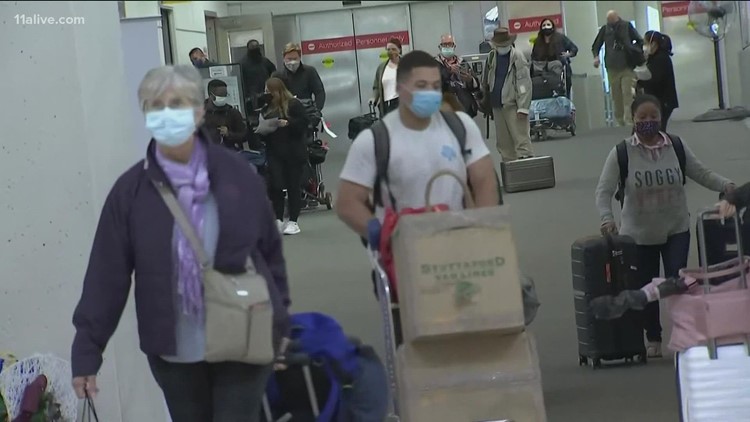ATLANTA — The new omicron variant now accounts for 90% of infections in the United States, according to the Centers for Disease Control.
The rate of infection is up from 13% for the week ending on December 11th and shows what medical experts predicted when the new variant was discovered; omicron is highly transmissible.
However, studies show there may be some good news to take from the new variant; it may cause less severe cases. Like delta, which became and remained the dominant strain since July, omicron quickly spread throughout the country.
Unlike delta, researchers found omicron is 10 times more likely to infect people who have already had COVID-19 and may have a lower risk of hospitalization.
A study from South Africa, where omicron was first reported, shows 80% of people are less likely to be hospitalized if they catch the new variant and have a 70% lower risk of severe illness compared to delta.
Research from a Hong Kong study shows omicron is better at traveling through the body’s airways, but not as good as getting deep into the lungs -- which could cause respiratory issues and a hospital stay reliant on oxygen.
Even though the studies show less people may require a long-term hospital visit, experts like Chief Medical Advisor to the president, Dr. Anthony Fauci says this news doesn’t mean hospitals won’t be impacted at all.
The sheer number of cases could still overwhelm hospitals, as people seek treatment. And the variant still poses a higher risk to those who are unvaccinated or never contracted COVID-19. That leaves close to 30% of Americans who haven’t received two doses of a vaccine or a shot at all.
“The quantity of infections, given the extraordinary efficiency of spread, might actually obviate that diminution in severity to the point where you still get a lot of significant disease. So, we cannot take this lightly at all,” said Fauci.
Fauci also said, while the studies are promising, it’s important to wait and see what will happen in the U.S. because of demographic differences and different levels of vaccination or previously infected people.
One caveat for medical experts: the studies are preliminary data, making it difficult to speculate on what will happen in the next few weeks or months. Also, there’s the idea that omicron itself is not less severe but happening during a time when there’s more preventative and treatment measures in place.
More people are vaccinated now than during the summer when delta emerged. And there are antiviral drugs shown to reduce the severity of COVID-19 related illness.
Pfizer announced its antiviral treatment cut the risk of hospitalization or death in high-risk patients by 89%, if administered within three days of symptom onset, and 88% within five days.
“In the early clinical trial data is that it's 90% effective at preventing hospitalization and death in unvaccinated populations. So, this is something that could be game changing." Johns Hopkins University Center’s Dr. Amesh Adalja told NBC News.
At-home tests are hard to find right now, and testing sites are experiencing long wait times -- posing a potential risk of people not knowing for sure they have COVID-19 as quickly as possible.
For now, medical experts remain cautiously optimistic, based off the preliminary data and the fact that there are tools to help fight the new variant.



